#the best russian tv providers
Explore tagged Tumblr posts
Text
The Reliable Russian TV app for App Store
For Russian-speaking viewers, it has never been easier to stay in touch with home entertainment with the arrival of Russian TV apps in the App Store. These applications enable users to watch different Russian TV series, films, and live broadcasts directly on their smart phones or tablets. Dramas, comedies, crime thrillers-Russian TV series can be accessed anywhere and anytime with these applications. Are you someone who wants to gather more facts about the Russian TV app for app store, Russian TV series streaming? If Yes. This is the best place where people can gather more facts about the Russian TV app for app store, Russian TV series streaming.
Stream Popular Russian TV Series
The App Store offers a lot of Russian TV apps that offer you an extensive library of TV series, from classic days to modern times. From the longest-running soap operas to the latest and greatest drama series, these apps bring you all the latest shows straight from the Russian television networks. Whether you are looking for family-friendly comedies, thrillers, or historical dramas, Russian TV series streaming apps will make sure you never miss any episode.

Russian TV app for App Store
Most of the Russian TV applications available on the App Store are user-friendly. The interface is easy to use, and the user can look for a show, browse genres, and get suggestions based on what they like. Many apps will also let you choose between subtitles or different language options to make the experience more accessible to you.
While some Russian TV apps are free with ads, others offer a subscription model with premium access to exclusive content and ad-free streaming. These subscription plans are usually pretty affordable, making it easy for viewers to enjoy an uninterrupted streaming experience without breaking the bank.
The Russian TV app for app store. The perfect tool for any Russian TV series fan, who needs to catch up on what is currently showing and streaming: they are now easily accessible. You can find thousands of episodes to stream or download in many formats and on any subject; affordable subscriptions allow for unlimited entertainment and an entertaining, relaxing atmosphere in which you can view them at your own pace and on your favorite devices, from anywhere and anytime.
0 notes
Text

In the 1960s, there was one actor who could justifiably claim that ladies prefer blonds. As the secret agent Illya Kuryakin in the TV series The Man from UNCLE, David McCallum, who has died aged 90, received more fan mail from young women than any other actor in MGM’s history.
With his Beatles-style haircut, his liking for black turtleneck sweaters (which created a fad among viewers nationwide), and an aloof and enigmatic air, through which he sneaked a fair amount of charm and self-amusement, McCallum made Kuryakin into a sex symbol of the period. He provided a trendy contrast to Robert Vaughn’s Napoleon Solo, his fellow spy, who went in for expensive suits and ties.
Although Solo and Kuryakin worked perfectly in tandem, their personalities were at variance, the former being urbane, easygoing and sociable, the latter more reserved, intellectual and intense.
The James Bond film craze had already taken off when The Man from UNCLE series was launched in 1964, so US audiences were used to laidback heroes and their villainous nemeses. However, it was surprising to find a hip Russian alongside the good guys of United Network Command for Law and Enforcement fighting against the evil organisation THRUSH (an acronym for Technological Hierarchy for the Removal of Undesirables and the Subjugation of Humanity), during the cold war.
McCallum, who played Illya with the slightest Russian accent and an occasional Scottish lilt, was also known recently for his long-running role from 2003 in the popular CBS crime series NCIS.
He was born in Glasgow. His parents were classical musicians; his mother, Dorothy Dorman, a cellist, his father, David McCallum, a violinist and leader of the London Philharmonic Orchestra. McCallum Jr won a scholarship to University College school in Hampstead, north London, before being accepted at Rada, where he studied from 1949 to 1951, having given up his ambition, and his parents’ wish, to play the oboe professionally.
In 1951, McCallum managed to satisfy his love for both music and the theatre by landing the position of assistant stage manager at Glyndebourne opera. However, he was called up to do his national service in West Africa. Demobbed as a lieutenant, the 19-year-old McCallum headed for the theatre, which mainly meant stage-management jobs in rep.In 1956, he half-heartedly posted off some photographs of himself to the Rank Organisation, which was scouting for young talent. The photos were seen by Clive Donner, who was casting his first feature, The Secret Place (1957), and he invited McCallum to do a reading.
“Although he was nervous, his voice was firm, and he was very good,” Donner recalled. “I sat and looked at him for a long time. He was very skinny, with a marvellous head and huge eyes. I think he was living in a bedsit in Archway at that time and had little money. We put him under contract straight away.”
Obviously under the influence of James Dean, the leather-jacketed McCallum, playing a young punk involved in a heist, does his best to express teenage angst. In Cy Endfield’s gritty thriller Hell Drivers (1957), McCallum plays Stanley Baker’s brother, on crutches as a result of a crime. In the cast, as a waitress, was 20-year-old Jill Ireland. McCallum and Ireland were to marry a few months before the film’s release. Soon after, they played young lovers in Robbery Under Arms (1957), an adventure shot mostly in Australia. At that time, the couple were often pictured together in fan magazines.
It was back to British realism with Basil Dearden’s Violent Playground (1958), in which McCallum plays a juvenile delinquent gang-leader. Despite a mite too posh an accent, he makes a vivid impression with his drawn features and mop of fair hair.
There followed several more conventional supporting roles, such as radio operators, first on the Titanic in A Night to Remember (1958), and a jumpy one in an Elstree-studio Burmese jungle in the second world war drama The Long and the Short and the Tall (1961). He was even more nervy in John Huston’s Freud (1962) as one of the first of the psychoanalyst’s patients, a young man who assaulted his father because of an incestuous love for his mother.
After appearing as a sympathetic officer in Peter Ustinov’s Billy Budd (1962), McCallum went to Germany to make John Sturges’s The Great Escape (1963), the most expensive PoW picture of them all. Among a starry cast, headed by Steve McQueen, James Garner and Charles Bronson, McCallum held his own among the Brits as Eric Ashley-Pitt – “Dispersal – who devises a way of getting rid of dirt from the digging of an escape tunnel. But more significant for him was the fact that Ireland, who was with him during the shoot, fell for Bronson. Ireland and McCallum divorced; he later married Katherine Carpenter, while Ireland married Bronson.
McCallum, who was already making his principal career on television, was given the secondary role of Kuryakin in The Man from UNCLE, but was soon granted equal billing with Vaughn after it rapidly became clear that he had a huge fanbase. Alma Cogan recorded a song called Love Ya, Illya, which became a pirate-radio hit in Britain in 1966, and as late as 1991, an Argentinian funk duo named themselves Illya Kuryaki and the Valderramas, after McCallum’s character and the Colombian football player Carlos Valderrama.
The first feature-film spin-off from the TV series, To Trap a Spy (1965), in which McCallum had a minor role, did little business. But the second one, The Spy With My Face, co-starring McCallum, really lifted off, followed by the box-office hits One of Our Spies Is Missing, One Spy Too Many and The Spy in the Green Hat (all 1966), and How to Steal the World (1968).
After The Man from UNCLE finished in 1968, McCallum continued to make guest appearances on TV until his second long-running series, the BBC’s Colditz (1972-74), in which he played Flt Lt Simon Carter, a hot-headed RAF officer who is impatient to escape.
Subsequently, McCallum appeared and disappeared as a scientist in The Invisible Man (1975-76), a US TV production, and co-starred with Joanna Lumley in ATV’s spooky sci-fi series Sapphire and Steel (1979-82) as the eponymous extra-dimensional detectives sent to Earth to monitor threats to the time-stream.
McCallum was seldom off television screens over the next three decades, making the occasional sortie into films. He also did some theatre in New York, where he and his wife had settled, notably Julius Caesar in a Central Park production (2000), playing the title role as “a senile old man, suffering from ideas of grandeur” according to the actor; and portraying the Emperor Joseph II on Broadway in Peter Hall’s revival of Amadeus (1999-2000).
In 2003, his looks belying his age, McCallum began playing Dr Donald “Ducky” Mallard, chief medical examiner, in the TV series NCIS, following the cases of the fictional agents of the Naval Criminal Investigative Service. His research for the part included studying pathology and sitting in on autopsies. He stayed with the show for the rest of his life, appearing in all 20 seasons up until this year. In one episode, a character asks another what Ducky looked like when he was younger. “Illya Kuryakin” comes the reply.
McCallum is survived by Katherine, their son, Peter, and daughter, Sophie, and by his sons Val and Paul from his first marriage; Jason, his third son with Ireland, died in 1989.
🔔 David Keith McCallum, actor; born 19 September 1933; died 25 September 2023
Daily inspiration. Discover more photos at Just for Books…?
39 notes
·
View notes
Text
Shady's Guide to Piracy.
First up: I highly recommend you use Firefox or Opera as a browser.
Next : Install uBlock Origin if you haven't already. Streaming / Watching Online
Sports (including Hockey) Create an account to not have to do math from weird timezones and to read in English rather than Russian. http://livetv.sx/en/allupcoming/ Hockey My backup for hockey if livetv is being weird. https://1stream.eu/nhlstreams TV/Movies The best I've found since Soap2Day went down. https://1hd.to/home My backup is https://fmoviesz.to/home Friend Kaotic recommends https://bstsrs.one
Torrenting
Torrenting is downloading via a whole bunch of people in a hive. The advantage is you now have a copy on your computer. The disadvantage is your ISP knows you did it and will send you a message. The severity varies from ISP to ISP. Step One: Get a VPN. I like Windscribe, but VPNs are mostly the same across the board. https://windscribe.com Step Two: Get a Torrent program. I use qBittorrent https://www.qbittorrent.org Step Three: Find Torrents. TV shows / Movies, I use EZTV. There's A LOT there. I typically just download the lowest resolution/smallest file if I'm watching it on my laptop, but if you want to stream to your TV or watch it on a big screen, choose a larger resolution. https://eztv.re Or https://yts.mx For Software, I use Pirate Bay or 1337x https://thepiratebay.org/index.html https://1337x.to/home/ Always click a magnet link if there is one. If you need help, send me a message and I'll do my best to provide.
26 notes
·
View notes
Text
The anti-abortion movement in Russia has been gaining momentum for years. Public figures now speak frequently about the prospect of a total ban on the procedure, while less drastic restrictions are regularly imposed in regions around the country and in Russian-occupied Ukrainian territory. One of the main players in Russia’s changing abortion politics is the Women for Life foundation, established by Natalya Moskvitina. Among other things, Moskvitina believes rape victims should give birth, “true womanhood” is only possible through motherhood, having fewer than three children is a “global evil,” and abortion leads directly to war. Her foundation, which openly instructs its volunteers to employ “manipulation” and deceit when talking with pregnant women, has received grants and funding from Putin’s administration. An activist from the group Feminist Anti-War Resistance who goes by the pseudonym Aida Zhivikh recently infiltrated online chat groups run by Women for Life volunteers, dug into the organization’s operations, and spoke with experts for an article about the fight against abortion in Russia. In English, Meduza breaks down the main findings from Aida Zhivikh’s reporting, with minor additions.
Limited access
In recent years, Russian officials and activists have increasingly begun talking publicly about banning abortion, ending its coverage under government health insurance, limiting access for minors, and imposing other measures to make getting the procedure more difficult. So far, there are few real restrictions in place, but the situation has been changing. Starting in September 2024, medical abortion drugs will be classified as restricted medications, which will complicate how doctors prescribe them and limit their availability.
In some Russian regions, access to abortion is already becoming more difficult. In August 2023, Mordovia passed a law prohibiting “coercion” into abortion, and over the course of the year, several regions announced that all or many private clinics would stop providing abortion services. All this was brought about by the Women for Life foundation, started by Natalya Moskvitina (a host on the Orthodox Christian TV channel Spas) and Boris Korchevnikov (general director of Spas and host of the propaganda TV program “Life and Fate”). Moskvitina refers to the foundation as “anti-abortion.”
Women for Life started as a grassroots social movement — activists organized anti-abortion campaigns and gave lectures on pre-abortion counseling. But the organization’s work begun to change when it was registered as a charity.
Alena Buldakova, the director of the Women for Life foundation, outlined the mission of their “Hello, Mom” anti-abortion project:
Our goals are to preserve life before birth, to reduce the number of abortions; our task is to motivate a woman to joyfully give birth to healthy children and be happy and to advise doctors on how to communicate with an uncertain woman so that she makes a positive reproductive choice.
According to Natalya Moskvitina, Vladimir Putin recognized the foundation’s anti-abortion project as “one of the best” and endorsed the idea of taking abortions away from the private sector and putting them under “full state control.”
In 2022, Women for Life was awarded the top grant in a competition, five million rubles (about $55,000), to implement the “Hello, Mom” project in Mordovia. That same year, the foundation received a grant from Russia’s ruling United Russia party. Mordovia’s law banning “coercion” into abortion was developed with Moskvitina’s help as a continuation of the “Hello, Mom” project.
Now, the Tambov regional parliament is considering a “coersion” bill of its own. In Tatarstan, private clinics have started refusing to perform abortions, while in Kaliningrad, authorities are considering banning non-state organizations from terminating pregnancies. A Women for Life employee confirmed to Aida Zhivikh that the foundation is involved in these initiatives.
Eight Russian regions have officially signed agreements with the project: the republics of Komi, Mordovia, and Tatarstan, as well as the Arkhangelsk, Tambov, Tula, Novgorod, and Magadan regions. A foundation employee told Aida Zhivikh that by the New Year, they hope to have agreements signed with the Kaluga and Tver regions; local authorities have already given verbal agreement. There are also plans to implement the program in the Chelyabinsk, Voronezh, and Lipetsk regions.
‘Professional manipulators’
The Women for Life foundation has a federal hotline that receives funding from the Russian government’s “Demographics” project. This year, advertisements for the hotline were placed on the streets of several Russian cities, while its number is listed on the websites of various clinics, women’s health centers, and city departments. The hotline’s operators are not required to have a degree in psychology or medicine
Aida Zhivikh called the hotline and said she was worried about an acquaintance who got pregnant but didn’t want to give birth because she had other plans for her life, and her partner was in a combat zone. The consultant advised her to “scare” her friend by telling her that terminating the pregnancy would leave her with physical and mental health problems, and to emphasize that abortion is “murder.” The consultant also referred to the fetus as a “defenseless infant.” When asked what to do if the friend’s partner dies, the person on the phone replied that being a single mother “has its advantages” in terms of getting additional government benefits.
During another conversation with a “volunteer psychologist” in which Aida Zhivikh said she was living in a dorm and not ready to have a baby, she was told that raising a child is easier than its seems. “They don’t even start seeing right away,” said the volunteer. “What kind of parenting is there at the very beginning? What will the baby need from you? Do you think the infant will cry, ask for its mother’s breast, and think to itself: ‘Oh, is my mother financially independent or not?’ How can you even assess the quality of attention? Parents are like gods to their children until they’re seven. Everything the mother says and does is just undisputed.” The volunteer also said that at four weeks of pregnancy, the embryo looks like a “little human being,” which is not the case.
At the end, the volunteer added: “And do you know that there are serious consequences to terminating a pregnancy? Statistics show that women always develop depression or psychiatric disorders two years after an abortion. For some, it’s more pronounced — for others, less so. Plus, there are health consequences: infertility, for example, but there are other consequences as well.”
According to a certified psychologist who spoke to Aida Zhivikh under the condition of anonymity, the women using the hotline may not understand what kind of organization they’re consulting. The foundation writes that the hotline is for “pregnant women in difficult life situations.” In the U.S., crisis centers for pregnant women operate similarly, masquerading as organizations that provide assistance to women when, in reality, their goal has nothing to do with the well-being of the patient — they simply want to discourage abortion. The psychologist explained the dangers of this approach:
A woman may indeed feel lost and in need of support. The very fact that she’s calling the hotline shows she’s not 100 percent sure of her decision, whatever it may be. There’s nothing wrong with informing her about the government support measures for mothers. What is harmful is manipulation. The charitable foundation and the specific consultant-manipulator won’t take responsibility for this woman and her child for their whole life. In fact, they exploit the vulnerability of a confused pregnant woman for their interests, not hers.
The foundation’s strategy extends into healthcare settings; it has developed scripts for medical professionals to use when communicating with pregnant women in clinical settings. “The first thing a doctor does is congratulate the future mother,” explains Moskvitina. “He gives them a brochure about all kinds of assistance — from the state, regional government, non-profit organizations, from business.”
Volunteers learn to dissuade women from having abortions in chats rooms, on forums, and on social networks. During the training sessions, the foundation’s “psychologist,” Irina Bochkovskaya, openly called the work manipulation:
It's important to challenge the [women's] perceptions. If someone writes: ‘I don't want a child,’ it doesn't mean that we shouldn’t try. We can give this child a chance. So, she writes she doesn't want it. But what's her situation? Did she ever want to become a mother? And why does she think she’ll get another chance to be pregnant? We’re shaking up perceptions here, and this is the special beauty of manipulative work with people. Ultimately, you must become professional manipulators — people capable of changing another person’s perceptions, opinions, and desires. As scary as it may sound, that’s what it is, in fact.
Every day, trained volunteers are sent links to posts made by women considering abortion, including those who have been raped or have medical reasons for terminating a pregnancy. In the volunteers’ chat, they’re advised to leave comments that would nudge the woman towards “preserving life.” They ask people to like their comments so that the algorithm favors them, or so they get a “top comment” badge.
Some volunteers make up stories that sound like those of the women posting, while others make blatant manipulative and intimidating comments that can induce feelings of guilt and fear. They also misrepresent emergency and oral contraceptives as abortion methods.
The foundation considers those who support a woman’s right to choose as advocating for abortion. Those working for the foundation are convinced that some of these people are “Satanists” and “on the payroll of Western countries.”
Womanhood only through motherhood
Natalya Moskvitina’s personal stance is also noteworthy. She believes that abortions should be banned at the legislative level, “just like drug addiction, prostitution, and pedophilia.” In her view, informing people about contraception is promoting “lust,” and women who become pregnant from rape should give birth. Moskvitina holds that a woman “only becomes a woman when she becomes a mother.”
All women reach self-realization through motherhood. The most important priority, the natural need of a woman, is motherhood. And naturally, there shouldn’t be just one child: it’s very difficult with only one. With the second, it's more or less possible to manage in life, but the real joy starts with three. […] A woman truly feels like an individual only when she, having already had children, can throw energy into her own creation. That’s after the third child. Women nowadays deprive themselves of these blessings when they choose to have fewer children or an abortion, which is a monstrous global evil. This evil can’t be justified by anything at all.
According to Moskvitina, the prevalence of abortions provokes wars:
We looked at the demographic map to see where the worst [situation] regarding abortion is in the CIS countries. And we saw that it’s Donetsk and Luhansk. You look at this and see what’s happening now, and you understand: maybe it had to be this way. If we kill our children — and this is a war that isn’t visible — then later comes the actual war.
Every week, with the support of the Women for Life foundation, “anti-abortion prayer services” are held at the Alexander Nevsky church at the Moscow State Institute of International Relations. During one of these services, priest Fyodor Romanenko also linked abortion to war:
It’s important for us to pray that our whole land will be rid of this. Because this is one of the answers to the question of why our great, mighty, rich country lies not exactly in ruins, but in a very strange state… when it cannot use its power or its resources, when everything is going wrong. It’s precisely because abortions continue in this country. Many ask why the Lord doesn’t now give us great military leaders like Prince Alexander Nevsky, Dmitry Donskoy, Alexander Suvorov. Why we don’t now have great scientists and poets. The Lord sends them – but not all of them are allowed to be born.
If you or someone you know has been a victim of rape or sexual assault, please reach out to one of the following resources for support:
Rape, Abuse & Incest National Network (for U.S. readers)
Rape Crisis Network Europe (for E.U. readers)
Canadian Resource Centre for Victims of Crime (for Canadian readers)
28 notes
·
View notes
Text
Dolores del Rio - Hollywood's First Latin Superstar
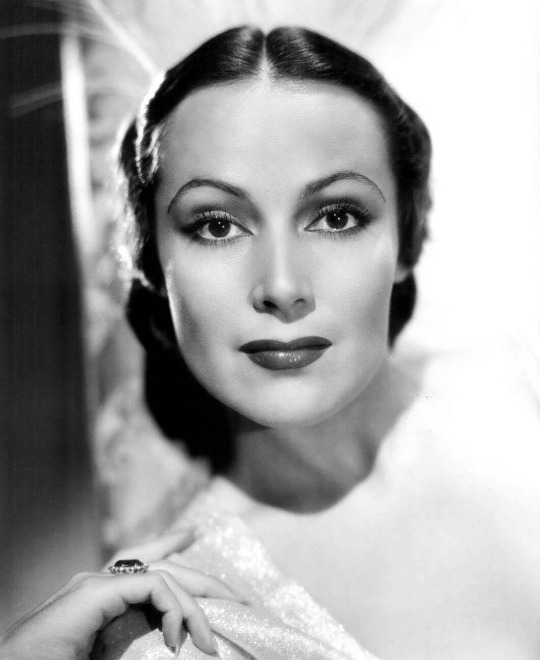

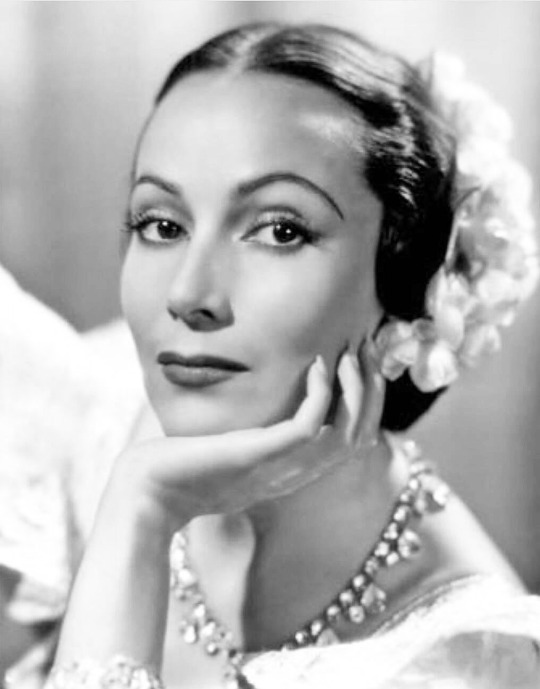

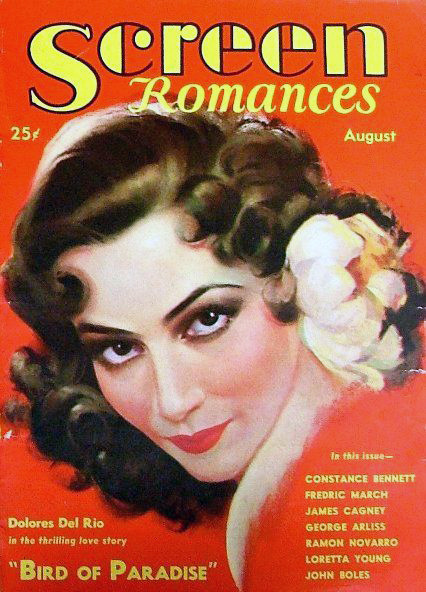
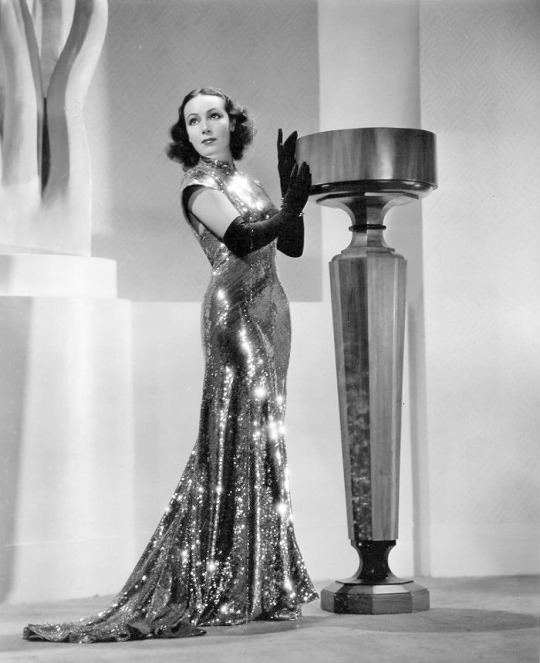
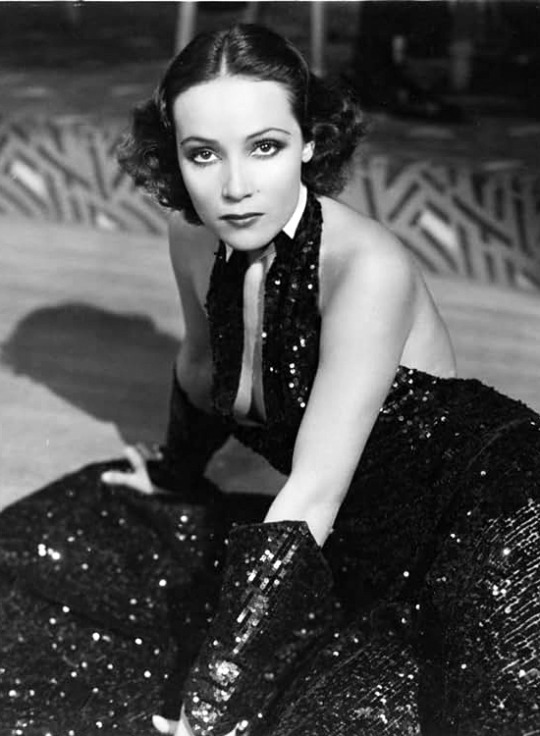

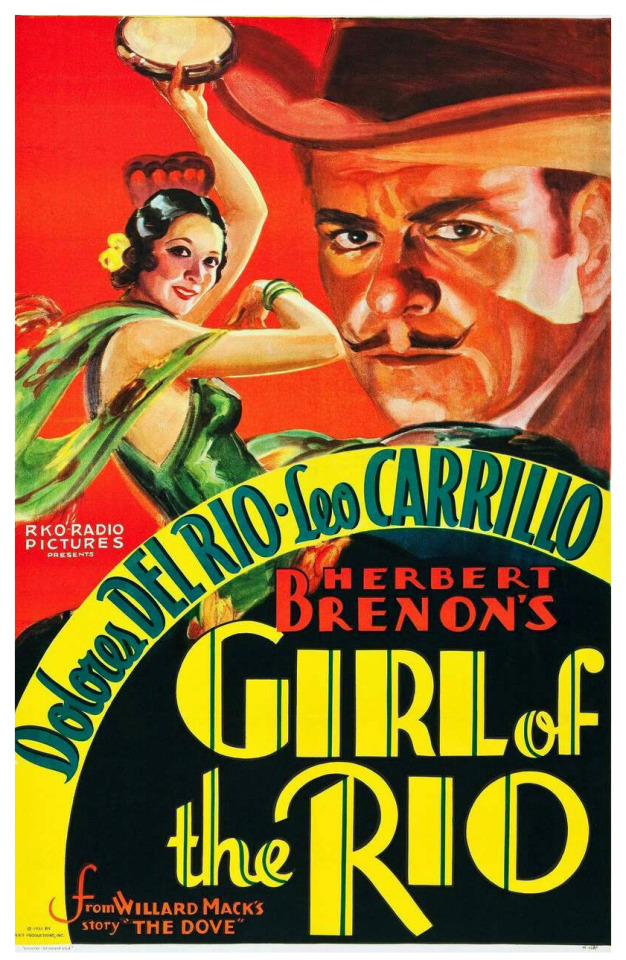

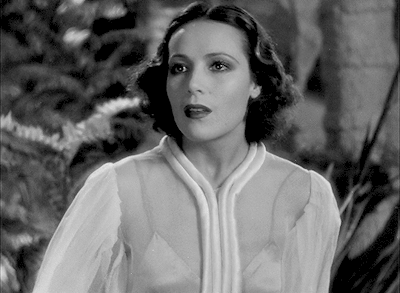
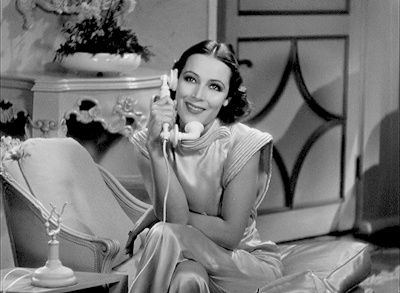
María de los Dolores Asúnsolo y López Negrete (born in Victoria de Durango, Durango on 3 August 1904), known professionally as Dolores del Río, was a Mexican actress whose career spanned more than 50 years. With her meteoric career in the 1920s/1930s Hollywood and great beauty, she is regarded as "Hollywood's First Latin Superstar."
Del Rio came from an aristocratic Mexican family whose lineage went back to Spain and the viceregal nobility. Her family lost all its assets during the Mexican Revolution. She developed a great taste for dance at a young age, which awakened in her when her mother took her to one of the performances of the Russian dancer Ana Pavlova.
In 1925, she met American filmmaker Edwin Carewe, an influential director at First National Pictures, who was in Mexico at the time. He convinced her to move to Hollywood. After a couple of years, United Artists became interested in her and signed her to a contract. Her career blossomed at the studio, and she made memorable films such as Ramona (1928) and Evangeline (1929). After her contract was terminated, she was hired by RKO Pictures ,then Warner Bros, and then 20th Century Fox.
Unfortunately, Latin stars had less opportunities in Hollywood then, and her career declined. She returned to her birth country, where she became one of the most important female figures in the Golden Age of Mexican cinema.
Del Río returned to Hollywood and made movies and TV shows. However, she continued to produce and star in Mexico in film and theater projects.
She died from liver failure at the age of 78 in Newport Beach, California. Her remains have been interred in the Rotonda de las Personas Ilustres in Mexico City since 2005.
Legacy:
Won the Silver Ariel Award (Mexican equivalent to the Oscars) for Best Actress three times: Las Abandonadas (1946), Doña Perfecta (1951), and El Niño y la niebla (1953); and was nominated two more times: La Otra (1946) and La Casa Chica (1949)
Awarded the Best Actress by the Instituto de Artes y Ciencias Cinematográficas de Mexico for Flor Silvestre (1943)
Named as one of the WAMPAS Baby Stars of 1926
Was the model of the statue of Evangeline in 1929 located in St. Martinville, Louisiana
Honored as one of the best dressed woman in America with the Neiman Marcus Fashion Award in 1952
Received a medal for her outstanding scenic work abroad from the Asociacion Nacional de Actores in 1957
Selected as the first woman to sit on the Cannes Film Festival jury, and even served as the Vice President, in 1957
Co-founded the Sociedad Protectora del Tesoro Artistico de México, responsible for protecting art and culture in México, in 1966
Given the Diosa de Plata Award by the Mexican Film Journalists Association twice: in recognition her contribution to Mexican film industry in 1965 and in commemoration of her 50-year career in 1975
Presented with a medal for her cultural contribution to the peoples of America by the Organization of American States in 1967
Was honored by Instituto Nacional de Bellas Artes y Literatura and the Mexico's Screen Actors Guild in 1970 with a tribute titled Dolores del Rio in the Art, where her main portraits and a sculpture by Francisco Zúñiga were exhibited
Was a spokeswoman of UNICEF in Latin America in the 1970s
Received the Golden Ariel Honorific Award in 1975 for her contribution to Mexican cinema
Formed the union group "Rosa Mexicano", which provided a day nursery for the children of the members of the Mexican Actor's Guild in 1970
Helped found the Cultural Festival Cervantino in Guanajuato in 1972
Received the Mexican Legion of Honor in 1975
Received a diploma and a silver plaque for her work in cinema as a cultural ambassador by the Mexican Cultural Institute and the White House in 1978
Awarded the George Eastman Award, given by George Eastman House for distinguished contribution to the art of film in 1982
Has been the namesake of the Diosa de Plata (Dolores del Río) Award for the best dramatic female performance by the Periodistas Cinematográficos de México since 1983
Has murals painted on Hudson Avenue in Hollywood painted by the Mexican-American artist Alfredo de Batuc in 1990 and at Hollywood High School in 2002
Is the namesake of Teatro Dolores del Rio, built in 1992, in Durango
Chosen to be one of The Four Ladies of Hollywood, a sculpture at Hollywood-La Brea Blvd in 1993
Realized a tribute by fashion designer John Galliano in his 1995 Fall/Winter collection, Dolores.
Stipulated that all her artworks be donated to the National Institute of Fine Arts and Literature of Mexico, for display in various museums in Mexico City, including the National Museum of Art, the Museum of Art Carillo Gil and the Diego Rivera & Frida Kahlo House-Studio
Included in a cameo in the Disney-Pixar animated movie Coco in 2017
Honored in three monuments in Mexico City: a statue located in the second section of Chapultepec Park, a bust located in the Parque Hundido, and another bust in the nursery that bears her name.
Honored with two streets named after her: Blvd. Dolores del Río, in Durango, Mexico, her hometown and Dolores del Rio Ave. in Mission, Texas
Honored with a Google Doodle on her 113th birthday in 2017
Has her star on the Hollywood Walk of Fame at 1630 Vine Street for motion picture

#Dolores Del Rio#Evangeline#Mexico#Latin#Latina#Hollywood's First Latin Superstar#Latin Actress#Mexican Actress#Mexicana#Golden Age of Hollywood#Film Classics#Old Hollywood#Vintage Hollywood#Hollywood#Hollywood Walk of Fame#Walk of Fame#Movie Legends#movie stars#1900s#28 Hollywood Legends Born in the 1900s
9 notes
·
View notes
Text
How Vladimir Makarov would react to you getting hurt during a safehouse raid. (Child edition)


You were Makarov's only child, and the only one who he cared about other than himself. He wasn't the best father by any means, never being around and always being distance with you, rather choosing to show up, buy you something expensive and leave again, but he did his absolute best to make sure you were safe as he knew his reputation made him, and by extension you, a target. You were at one of the safehouses, the Konni soldiers attending to you as usual until you heard gunshots and before you knew it, the Konni soldiers were dead. You were terrified and hid under your bed, trying to hide before eventually being found out. You were dragged from underneath your bed and eventually beaten and left for dead in your own bedroom, the assailant trying to kill you despite you being a child to get back at your father. Although there were thankfully alarms on the safehouse, especially since it was the one you were in and more Konni soldiers quickly arrived and found you. You were immediately treated by a few of the medics that were with the backup soldiers, although thankfully you only suffered severe bruises, cuts and a broken arm. Your father had an alarm where he would be immediately notified if the alarms went on in the safehouse as you were there so he was on edge after getting the notifications, although it quickly turned to fury once his soldiers informed him of what happened to you. You were immediately rushed to the nearest, and private, hospital, being put under a fake name and having one of his soldiers be your so-called Uncle so he could stay with you until Makarov arrived. You had a private room and were immediately given treatment, partly because you were a child, and partly before your father paid extra for extra treatment. You were given the best food the hospital could provide and flavoured medicine so it would taste nice, and you even had a TV and a window view so you could watch your cartoons as well as the falling russian snow. You lied comfortably in your bed, it being a one that would recline of course, snuggling under your extra blankets as your fathers soldier watched over to you before your father arrived, under a fake name too, of course. He paid all of the medical bills without question, although when the doctor gave him the paper that said all of your injuries, he had to control himself not to... Well... 'No russian' the whole hospital and he probably would have if you weren't in said hospital, although he managed to keep his anger under control once he walked into your hospital room. He would now never leave your side, escorting and helping you to the adjacent and private bathroom in the hospital, and if any of his soldiers needed his input, he'd give them it from the hospital before tending back to you. He'd get angry if anything you wanted or needed wasn't given you to immediately, and he wasn't afraid of mouthing off or any of the nurses if they took too long getting another carton of your beloved apple juice. Once you finally were able to be discharged, you were now always with your father, on missions, in the safehouse, you were always with him, but if he couldn't, you'd always be in a safe and reinforced place with cameras and hed always be watching you, and if you were with him, child leash you it was, even when you grew up into a teenager.
9 notes
·
View notes
Text
Peace and human rights are undesirable for the Russian authorities. How can Russians defend their choice?
You are watching news from the weekly rally at the Russian Embassy in Lisbon. Today is January 27, 14:30.
On January 22, it became known that the Anti-War Committee and our colleagues in Spain and France were declared undesirable in Russia. On January 25, our representative attended a meeting with Russian lawyer and human rights defender Pavel Chikov. Pavel explained that the concept of an undesirable organization is akin to "persona non grata". At the time of the meeting, the list of undesirable organizations included 128 organizations, among them: Open Russia, Transparency International, World Wildlife Fund, and the TV channel "Rain". https://ru.m.wikipedia.org/wiki/List_of_undesirable_organizations
The most dangerous part of Law No. 272-FZ is the punishment of supporters in Russia for reposts. The Russian authorities have programs that monitor the internet for keywords and links. A link to the website of an undesirable organization, its social media profile, its symbols, participation in its events, and media comments are considered as participation in its activities. For this, a fine is first issued, and for repeated participation, a criminal case is initiated.
Organizing the activities and financing of an undesirable organization, including donations, leads directly to a criminal case.
Russian authorities interact with countries such as Georgia, Turkey, Thailand. Visits to these countries, and especially to Russia, should be avoided. Remember, in addition to persecution for undesirable organizations, criminals in power in Russia have laws against spreading fake news about the army and many other ways to imprison you. The system is built on intimidation: by imprisoning one person, they intimidate thousands. Therefore, the best response to such actions is an increase in the number of people speaking out against the authorities.
Regarding property left in Russia, Dmitry Bykov said on Khodorkovsky Live: "Do you really think you can scare us by taking away our property? You've taken our Homeland from us!" https://www.youtube.com/shorts/QXn50CxbMbo
On January 24, a column by Anastasia Sergeyeva was published on the Civic Council website. She reminds of Svetlana Tikhanovskaya's victory in the Belarusian presidential elections. How her husband Sergey created an anti-corruption movement, and how after his arrest, opposition forces formed a coalition around Svetlana. It discusses the volunteer-driven election campaign that reached every home. Also, the parallel creation of a force resistance network, but its resources were not enough to protect the protesters. Anastasia notes that today Belarusians provide material and informational support to the Kalinovsky Regiment and the Belarusian Volunteer Corps. https://civiccouncil.info/podpis-za-nadezhdina-bez-sobstvennoj-armii-sovest-na-veter/
At the rally on January 21 in Lisbon, we read a statement to those gathered from the Siberian battalion. They are grateful to those who are already helping them and call on everyone to help new volunteers join the battalion. Right now, the Civic Council, together with Freedom birds for Ukraine, is raising funds for transportation expenses to transport a new group of our volunteers to Ukraine. Link in the description. https://www.paypal.com/donate?campaign_id=7F4CWC6RYGR82
Russian rock band B-2, which is against the war made by Putin's regime in Ukraine, was arrested in Thailand and they are planning to deport them to Russia. Last year, the group's leader publicly admitted that he financially supports the Ukrainian Armed Forces. According to Lyova, other members of the group support him. Their stance led to the mass cancellation of B-2's concerts in Russia.
The group was arrested for violations during the organization of a concert in Phuket, and there was hope that there would be a fine. However, the court decided on deportation, and the Russian ambassador is personally involved in ensuring that those group members who have Russian passports are sent to Russia.
Help spreading the information, we need to pressurize the authorities in Thailand so that not only Sergey Lavrov is pressuring them. Don't let good people be handed over to Putin for the GULAG!
A proof on the Ukrainian news site that B-2 support Ukraine (in Russian): https://www.unian.net/lite/stars/v-rossii-isterika-iz-za-pomoshchi-bi-2-vsu-trebuyut-zapretit-vezd-v-stranu-12466509.html Their profile on Spotify: https://open.spotify.com/artist/3SXDCIdqI1AR686ukKtKCq
2 notes
·
View notes
Text
🎙Today I figured I’d compile a Top 10 of my favourite Margaret interviews, with a bit (or a lot) on what I loved about each of them 🫶
Let me know whether you have any favourites that weren’t included!
1. TV Interview for Yorkshire Television Woman to Woman (02/10/85)
https(:)//youtu.be/Bzof-se9VKo?feature=shared


No notes, 10/10, golden buzzer, etc. For starters, I love love love Miriam Stoppard. The two were already acquainted due to Margaret being friends with Miriam’s husband, so that must’ve contributed to this absolute banger of an interview. She has a lovely voice, is very respectful, and extremely skilled at making Margaret open up without being intrusive. This felt less like a series of questions and more like a heart-to-heart. It chronicles her childhood, university years, marriage, and early political career, whilst providing loads of insight into the circumstances which have shaped her into who she is (the frugality of her upbringing being one of them). It’s really rare to get an extended and candid recollection of her personal life directly from the source (she herself has said that she was neither introspective nor retrospective, yet here she manages to be both) so if you don’t know much about her or have only ever consumed a one-sided narrative, I’d 100% recommend watching this.
Favourite quote: “Women always somehow, if they are left to cope, can cope. The whole world can be falling around your ears and someone will get up and carry on.”
2. TV Interview for ITN (28/06/91)
https(:)//youtu.be/L9H5nGDVfQ8?feature=shared


This was her first time opening up about her resignation - which had occurred eight months earlier over the course of a week - and I thought it was very interesting to hear her perspective on how things went down. I can't think of another occasion when she went into this much detail about it apart from the DSY memoir and the 1993 Breakfast with Frost segment. I generally like Michael Brunson and he’s one of her recurring interviewers so she must like him too. I don’t love how eager and pushy he came across at certain times here (eg: asking her to elaborate further on situations when she wanted to move on) but I think he did a solid job overall. If you're unfamiliar with the events, I'd advise you to first go watch the statement she made in Paris upon finding out she hadn't received enough votes to avoid a second ballot, then the confidence motion in the House of Commons, then her last speech outside of Downing Street, and THEN watch this interview. You'll not only have a lot more context but it also goes to show how much strain and internal struggle she was enduring, all the while appearing composed in public.
Favourite quote: “What you've done well, you're relieved about. It's a matter for relief, not for crowing."
3. TV Interview for ABC News This Week with David Brinkley (1983)
https(:)//youtu.be/wPUMEn9gJBs?feature=shared
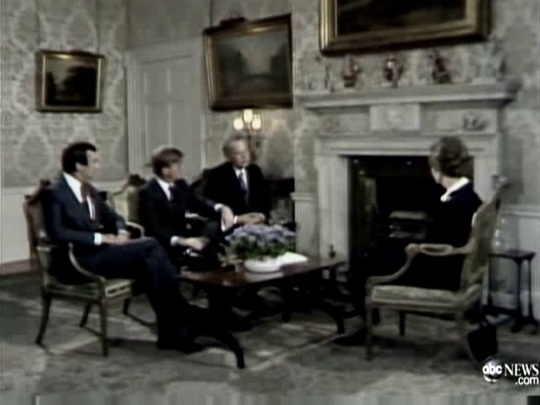

This is literally a masterclass on how to quietly dominate and lead an interrogation while being outnumbered by your interviewers. She was being questioned about the Middle East conflicts by three men who were clearly hoping to disarm her, but she was so self-assured and unbothered that it made their sternness look silly. There's another iconic interview in the same style from her first visit to the Soviet Union but I cannot for the life of me find it without the Russian dubbing. Whoever DM's me the original version will be named in my will.
On a superficial note, I'm obsessed with how she looked in 1983 specifically. While my favourite era for her fashion is the '90s, her hair and face in 1983 were - in my opinion - at their most stunning, and this interview is the best example of that.
Favourite quote: "I'm not quite sure about the significance of your second question. It seems strangely put."
4. Life & Career of Margaret Thatcher (09/03/91)
https(:)//www.c-span.org/video/?17011-1/life-career-margaret-thatcher


This one took place during her visit to the US for the Presidential Medal of Freedom. I love Brian Lamb’s style of asking intentionally broad questions and diminishing his own presence in order to let his guests shine, something many interviewers lack the humility to do. There's a quote of his that says: "Too many interviewers try to make us think they're smarter than the person they're interviewing. I assume I'm not smarter, and if I am smarter, I don't want the audience to find out." The complete interview is 30+ minutes and he maybe talks for a total of three - as is his habit. In turn, it gives her room to speak at length with no pressure. Considering she had a reputation amongst media members for being a feisty interviewee, it's nice to see how relaxed she is when she's not feeling like she's about to be interrupted or challenged in bad faith. I imagine this would be particularly interesting to watch if you’re American because she touches on the differences between the UK and US system (in terms of the role of the monarchy, the parliamentary debates, the government's accountability to the public, etc.) If you're someone who feels strongly about her privatisation policy, I'd also advise watching this because she does go into detail as to why it was needed, especially regarding the broadcasting industry.
Favourite quote: “Some of the press who opposed me most vigorously would never have existed but for my policies of increasing liberty and getting rid of restrictive practices and enabling them to start up. But they then opposed me. So what? That's life.”
5. TV Interview for Thames TV Afternoon Plus (01/06/81)
https(:)//youtu.be/CFY6e2r2_hA?feature=shared
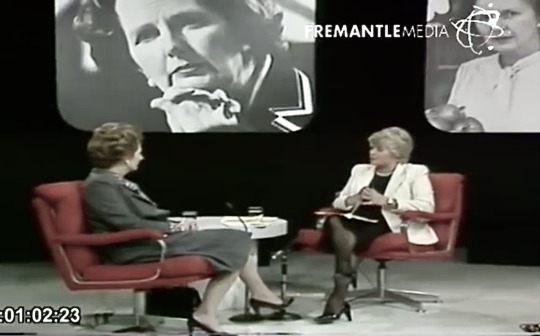

This was an interview that employed three different formats: the typical face-to-face questioning by the main journalist, then a pre-recorded vox pop of working-class people talking about their situation with Margaret having to comment on them, and then a live studio audience of career women there to debate her about various issues. I love this system because it showed how skilled she was at spontaneously handling any question/complaint. I think it was probably also beneficial for her to see and hear about the tangible effects of her policies in a context other than getting yelled at by protestors on the street. It was a much more productive way of connecting her with everyday people and letting their voices be heard. I also like that she talked about how difficult the task of cabinet reshuffling was (contrary to the common belief that she was sacking her ministers for sport).
Favourite quote: “If you put yourself in the front line you must expect to be shot at.”
6. TV Interview for Channel 4 A plus 4 (15/10/84)
https(:)//youtu.be/saA-gfBqpqw?feature=shared
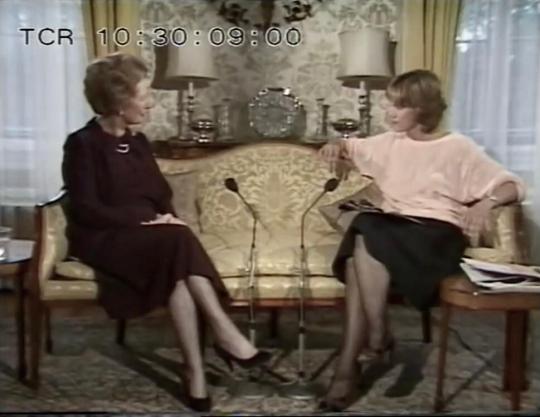

This was her first official interview after the Brighton Bombing and I’m so admirative of her for doing this despite how traumatic it must’ve been to revisit the events. She seems eerily calm here and I don't know how much of it is shock and how much is genuine serenity but either way, she spoke very well as per usual. The interviewer seemed sweet and well suited to cover such a sensitive topic in my opinion. She also did a great job at bouncing back on replies and making the conversation flow seamlessly. They got the stuff about terrorism out of the way pretty quickly and then moved on to usual topics (mostly unemployment, and the role of business owners in creating jobs), which I felt was the best way to handle it as opposed to dragging it on for the full 30 minutes. Then she answered questions sent in from members of the public, which covered a range of stuff from her scientific background to capital punishment. Overall I like that she got to have a talk that wasn't wholly focused on the attack but also got to say what she wanted to say on it.
Favourite quote: “The sun was just coming through the stained glass windows and falling on some flowers right across the church and it just occurred to me that this was the day I was meant not to see."
7. TV Interview for BBC1 Val meets the VIPs (05/03/73)
https(:)//www.margaretthatcher.org/document/208941


This one merges two of my favourite things: her interacting with a live audience, and her interacting with children. A lot of politicians (and adults in general) tend to take a patronising approach when talking to kids but I loved how she treated them with the same seriousness as any other interviewer, and made sure to give heartfelt, detailed replies. While the questions are naturally more basic than the likes of which she would normally receive, she does a great job at elaborating on each, and therefore I found this interview as interesting and revealing as any other. The fluidity and eloquence with which she speaks is also absolutely lovely to listen to, as is the case for all of her 1970s appearances.
Favourite quote: “Some women are very argumentative, you know, and might even win.”
8. TV Interview for Canadian TV (CBC TV) The Journal (27/09/83)
https(:)//www.cbc.ca/player/play/1662159934


Once again... 1983 my beloved. I remember being obsessed with this interview a few years ago largely because of her smudged eye makeup (intentional or not). The main theme here was national defence, and I loved her comments on why nuclear weapons were a necessary evil (she talked about that in much more detail with Robin Day in 1987 if it's something you're into). They also talked about trade unions and her attitude towards strikes. I actually quite enjoyed how argumentative the interviewer was, just enough to counter Margaret's points without coming across as stubborn. It's interesting to me that this interview is apparently iconic in Canada for being "explosive" and for the two "clearly hating each other" because I didn't get that impression at all? They obviously disagreed fundamentally but I've seen interviews where both Margaret and the journalist were much more aggressive (the Brian Walden fiasco, hello???) This one felt cold at most, but not *that* combative. Years later Barbara Amiel described the whole exchange as "rather like watching a pretty lizard mistakenly programmed to kill a mongoose" which I admit is a pretty funny way to put it, and also applicable to anyone who tries to confront Margaret 😭 (While we're here, daily mantra that Barbara Amiel is a disgrace to both journalism and womankind 🫶)
Favourite quote: “The day when this country, or any country, departs from old nostrums it will first have to decide what it’s going to put in their place.”
9. TV Interview for BBC1 My Favourite Things (07/01/87)
https(:)//www.youtube.com/watch?v=qeU_H6prrF8

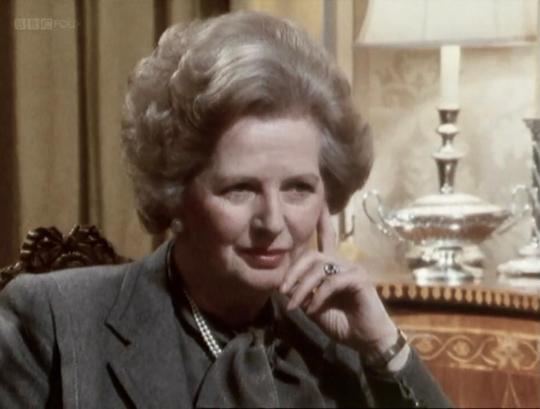
This is truly such a wholesome one, and I find the concept so unique. Basically what it says on the tin, the interview is structured around her favourite things. She'll have objects or people that she picked beforehand, and then explain why she loves them, like a little show-and-tell 🥹 It's everything from sculptures to poems to paintings, and she will tell a story about the influence that it has had on her life, and then the journalist will ask related questions to keep the interview moving. It's one of the longer ones, which is great because I love to hear her expand on topics that she personally loves. She doesn't talk about herself very often so it's so nice to hear about small things like her nightly routine or how happy doing wallpaper makes her. It's also educational to watch even if you don't particularly love or know her because she knows a lot of historical facts about people like Michael Faraday, so you'll definitely still learn things!
Favourite quote: “The Good Lord is no respecter of backgrounds. Never has been. He plants genius the world over. It is up to us to find it.”
10. KERA, a conversation with Margaret Thatcher (1991)
https(:)//youtu.be/Gbiohe_Baks?feature=shared


Finishing off with this purely for my own nostalgia because it was one of the first (if not the first) interviews of hers that I ever watched. It's not particularly special or different from the ones mentioned above but she talks a bit about the importance of a classical education (learning Latin and Greek, as well as memorising poetry) which I found pretty interesting. The interviewer was well-versed about her subject and had clearly prepared very thoroughly, which Margaret pointed out, and they seemed to get along really well.
Favourite quote: “In my case, you just had to have a star to steer by.”
#margaret thatcher#historical figures#history#uk politics#politics#interviews#ranking#journalism#top 10
6 notes
·
View notes
Text

" Baby, you can find me under the lights, diamonds under my eyes. Turn the rhythm up, don't you wanna just, come along for the ride? "
⌜ tyla , 22 , cis woman , she/her ⌟ ╱ is that DANCE THE NIGHT by DUA LIPA, i hear playing? oh that has to mean KAMARI CHOPRA , is about to clock in. i hear they're a SOPHOMORE who's been away studying SPORTS MEDICINE at USC. it sure is a shame they've grown up to be rather PASSIONATE and CALCULATED. word on the strip is that they're back home for the summer and working as a FRONT DESK RECEPTIONIST at THE FITNESS FACTORY, to earn some extra cash, in order to buy a new car but don't tell them i told you that !
►GENERAL INFORMATION
FULL NAME: Kamari Mali Chopra NICKNAME(S): Kam, Ari, Amari LABEL: The Academic Athlete AGE: 22 DATE OF BIRTH: February 5, 2002 ZODIAC: Aquarius Sun, Aries Rising, Capricorn Moon GENDER & PRONOUNS: Female; She/Her NATIONALITY: South African HERITAGE: Indian, Zulu, Mauritian, Irish SPOKEN LANGUAGE(S): English, Russian (very little) OCCUPATION: Dancer/Dance Instructor || Front Desk Receptionist at The Fitness Factory RELIGION: Christian (raised but now distanced) SEXUALITY & ROMANCE: Bisexual; Biromantic
► APPEARANCE
FACE CLAIM: Tyla HEIGHT: 5'3" WEIGHT: 121 lbs. DOMINANT HAND: Right HAIR COLOR: Black EYE COLOR: Brown SCARS: Little ones all over body due to wear and tear from sports TATTOOS: None.
►PERSONALITY
POSITIVE TRAITS: Charismatic, Athletic, Sociable, Passionate, Humorous, Driven, Open-Minded, Reliable, Thoughtful. NEGATIVE TRAITS: Fiery, Confrontational, Calculated, Flighty, Self-Critical, Impulsive, Impatient. LIKES: Early morning runs, holidays, the first fall of snow, the smell of a new pair of sneakers, thrifting, nailing a new routine on the first try, basketball, soccer, hockey, the cheering of a crowd, the adrenaline rush of a rollercoaster drop, glitter on one's eyes, funky hairstyles, out-of-the-box themes and ideas. DISLIKES: Being laughed at, losing a competition, not being able to get someone to crack a smile, when people start boo-ing others, when people try to peacock too hard, corny pickup lines, online dating.
►MENTALITY
PHOBIAS: N/A DISORDERS: N/A ALLERGIES: Seasonal (Pollen), Bees
►BACKGROUND
HOMETOWN: Johannesburg, South Africa CURRENT RESIDENCE: Los Angeles, CA/ Denver, CO EDUCATION LEVEL: BA in Sports Medicine from USC FAMILIAL CONNECTIONS: - Simone Chopra - 44, Mother, In Contact - Sherwin Chopra - 40, Father, In Contact
►FAVORITES
FOOD: Pizza DRINK: Sex on the Beach MOVIE: Confessions of a Teenage Drama Queen TV SHOW: Perfect Match, Too Hot to Handle BAND: Madonna, Dua Lipa, ABBA SONG: Levitating - Dua Lipa
► EXTRA INFORMATION
JUNG TYPE: ENTP ENNEAGRAM: The Enchanter (3w2) TEMPERAMENT: Sanguine MORAL ALIGNMENT: Neutral SIN: Pride VIRTUE: Drive ELEMENT: Fire CHARACTER PLAYLIST
"When the night's here, I don't do tears. Baby, no chance."
► BIOGRAPHY
Kamari was born in Johannesburg, South Africa, to two over-the-moon parents. Though she only spent her younger years in South Africa, her hometown still holds some of the best memories of her life. From dancing around with her mother in the kitchen, to singing with her father in a hammock. Her parents moved to Denver, CO, due to her father's job in the tech industry. He worked so hard to go back to school in order to provide once Kamari was an announced pregnancy. Little did he know that would uproot his family to America. Though, Kamari was excited as the 5 year old she was, that she was going on a plane and starting anew. Kamari easily rooted in Denver. Her charisma made her lots of friends, and her intellect made her somewhat of a teacher's pet. She was in Honor Society once she hit high school, and her dating life was overtly active. Even with her mother's worry, it was her father telling her mother to let her live her life how she wanted. Dance was all her idea. She excelled in any and every type of dance class she was enrolled in, and she always wanted to learn more. From belly dancing to tap classes, Kamari was absorbing it all like a sponge. It was to the point that she was put into competitive dance courses and competed for all of her high school years. She even went on to tour with a couple pop stars before going off to college. When granted a full ride scholarship to USC, Kamari was ecstatic. Her parents, though excited and proud, also faced some sadness with watching their young girl go off into the world without them. Kamari took up sports medicine as a major in order to appease her parents as she continues to dance on the USC dance team. Nowadays, Kamari is in Denver, CO, between semesters. She works as a dancer still - going on tour with some of the stars when offered. She also works as a dance instructor at the same place she took lessons as a kid; her side gig being that of a front desk receptionist at The Fitness Factory.
► PERSONALITY
Kamari is a party girl through and through. She's usually the life of the party, as well; Always able to peel people from the walls and getting everyone in high spirits with dancing. Kamari is a winner. She's so used to picking up various sports and skills and just being good at it. She's not used to losing, and that might be a downfall but to Kamari, it keeps her in tip-top shape. You can usually find her with a couple people around her desk; Gregarious to a fault and also a major flirt, Kamari attracts people to her like a magnet. She tends to lead people on both in a romantic sense, but also in a friend sense. Everyone thinks they're Kamari's best friend, but little do they know that they aren't. But, if you genuinely are one of her close friends, Kamari is reliable and a great person to go to when one's stuck in a rut. Kamari is basically FUN personified, okay? Okay.
► PLOTS
They're just girls, breaking hearts: Gimmie Kamari's girl group of friends! They're always out together and they gossip and shop together. Definitely a group that turns heads wherever they show up. Fun and wild vibes, all around! - OPEN (x3)
Jealousy, jealousy: Someone who is Kamari's frenemy who also is jealous of her and vice versa. These two attempt to one-up one another and their friendship is basically running on competition. - OPEN
Girls just wanna have fun: These are the friends who reach out to Kamari when they're in a funk and need to let their hair down. Definitely a balancing act of a friendship. They help to ground Kamari when she gets to be too much. - OPEN (x2)
My favorite bra lives in your dresser: Kamari is head over heels for this person, but they claim it's just casual. Kamari is starting to get frustrated and this person can tell. She's trying to be the cool girl in this situation, but she's ready to raise hell and confront them. - OPEN
Getcha' head in the game: This is someone who tags along with Kamari to games. They also tend to play basketball or even kick a soccer ball around with her. Very wholesome vibes of enjoying one another's company and friendly competition. - OPEN
My kink is watching you ruin your life: Exes on bad terms. We can talk about the specifics, but Kamari genuinely hates this ex's guts. It's almost a screaming match every time they cross paths. - OPEN
4 notes
·
View notes
Text
Unicorn: Warriors Eternal - Episode 2
I watched Unicorn: Warriors Eternal episode 2. I watched the first one on youtube and didn't know the second was out. But now I caught up on the series.

The great things from episode 1 still remain. So let's start with the ''negatives''. Let's go from the smallest ''problem'' to the biggest one. The reason why I used '' '' is because those things didn't bother me too much. But they might be for some people and it's worth addressing.
1. I know there are people who would love to see an entire episode dedicated to Edred/Dimitri and Alfie/Seng, because the first one was pretty much about Emma/Melinda. I personally don't mind because Emma/Melinda had to share her screen time with the lore and the setup for the story. Also, I hate when stories drag on for no reason if they don't have enough backstory for an entire episode add something else important! I think they implemented introductions to Alfie/Seng and Dimitri/Edred. Also, it's not like it's over. Their current and previous lives fighting for dominance seem to be a major part of the story. We just have to wait and see. Hope it's not a letdown.

2. The voice acting. I don't know if the voice actors for Emma and Alfie are young and inexperienced or if they try to put on an accent and they can't keep it and act emotionally at the same time but something's not right. When Emma is quiet and shy the voice actress fits perfectly but when she needs to shout, it's as if she doesn't want to wake her parents in the next room. And when Emma and Alfie have their Rush Hour 3-like comedy routine it's like they just reed lines and don't talk to each other. Dimitri/Edred has the best voice actor because he actually can emote and his voice is nice to listen to. This is great because it seems he's the one who's going to do a lot of talking with his personality and being the one who has to explain a lot of stuff because he for some reason can remember more than the others. (I will write about it later.) I've seen people upset that after his transformation he lost his Russian accent. I understand. In the limited time he was on screen Dimitri charmed a lot of people and out of all characters, he looks the least like his original self. He only kept his outfit. But I think it can be a great indicator of who is talking. If it's a Dimitri who's in control we will hear his accent. At least I hope so. It would've been a waste if they didn't use it. All in all, I don't mind and it should get better as the series goes on.

3. Timeline? The only date we have been provided is 1772. That's when the school for orphaned boys has been established. We have no idea how long it's been active and how long it's been abandoned. It can be the 21st century with steampunk coating for all we know.
youtube
4. My biggest problem with this scene is how confusing it is. Emma is watching Winston play against the boys from the school for orphaned boys. I guess they let boys of all ages play because Alfie is referred to as just a kid even after who knows how much time has passed since then. In all the information about the show, the word teenagers keep coming up. I don't know about you, but for me, a teenager is a person from the age of 13 to 19. You know? The -teen part! Emma was about to get married so I assume she's 18 at least. I guess Dimitri is 18/19 because he must be old enough to travel on his own. Unless he had run away from home.
Just out of curiosity, I googled marriage in 18th-century England. These are the results!
Until 1823 the legal age in England for marriage was 21 years for men and women although after 1823 a male could marry as young as 14 without parental consent and a girl at 12 although most girls didn't marry until around the ages of 18 to 23.
And there you have it folks! The show takes place after 1823 and Emma is around 18/19 years old. But hey, it's just a theory. A TV show theory! And cut.

This episode was fun. I have to admit I feel kind of smug knowing I predicted the love triangle. Wait is a triangle if there are 5 people in it? Emma loves Winston, Melinda loves Edred, and Dimitri might have some attraction to Emma/Melinda but he could've just been nice. .) Shipers, your time has come!
#Unicorn: Warriors Eternal - Episode 2#Unicorn: Warriors Eternal#Unicorn Warriors Eternal#uwe edred#uwe#edred#melinda#uwe melinda#emma#uwe emma#Edred/Dimitri#Alfie/Seng#6 Unicorn Warriors Eternal spoilers
9 notes
·
View notes
Text
amas is the best spokesman for Israel. The most gruesome footage of the atrocities of October 7 comes from the body cameras worn by the invading savages. Unlike the Nazis yemach shemam, notes the estimable Douglas Murray, the Hamas murderers were not even ashamed of their lack of any flicker of humanity.
Next Ghazi Hamad, a senior member of Hamas’s political bureau, proclaimed on Lebanese TV that Hamas’s attacks on October 7 were just the first of many to come, and that the Gaza-Israeli border would be one of continual warfare. “Israel is a country that has no place in our land. We must remove it because it constitutes a security, military, and political catastrophe to the Arab and Islamic nation,” he explained. In short, Israel must be destroyed.
There is no reason to doubt Hamad’s sincerity on this point. He is simply repeating what is already explicit in Hamas’s charter. Thus Israel has no choice but to destroy Hamas. Indeed Israel may be obligated to do so under the anti-genocide conventions, in light of Hamas’s expressed genocidal intent towards the Jews of Israel.
Israel’s entry into Gaza has nothing to do with exacting revenge. It is an act of self-defense, pure and simple. True, the bloodthirsty mobs on campuses and in major metropolitan areas worldwide bellow that Israel is a colonialist intruder in the Middle East, and lacks any right to exist. But they can hardly expect Israel to acquiesce in that judgment and agree to its own disappearance. Point one.
Point two: Destroying Hamas requires destroying its vast network of underground tunnels, which rival the London underground in length, and eliminating its entire military command and infrastructure.
Point three: Because Hamas locates all its military assets in or under civilian areas — hospitals, schools, mosques, and apartment buildings — that destruction will inevitably result in the deaths of civilians. Of course, we will never know how many, as figures reported by the Hamas Health Ministry lack all credibility. That same Health Ministry claimed 500 dead from a bomb on the Al-Ahli Arab Hospital — a claim dutifully reported by the international press. The actual number was 50 or less, and from an errant Islamic Jihad rocket to boot.
Similarly, in Operation Defensive Shield in 2002, Palestinians claimed that Israeli forces killed 5,000 Palestinians, and UN Special Middle East Envoy Terje Roed-Larsen and Philip Reeves of the Independent buttressed those claims with descriptions of the smell of death so pervasive one could simply not stand in Jenin. The actual number of Palestinian deaths, however, was 56, of which almost all were Palestinian fighters.
However many or few Gazan civilians have died or will die in the current fighting, all their deaths are attributed to Hamas under international law as a result of Hamas’s refusal to observe the rule of distinction, which requires it to separate military infrastructure from civilians.
Hamas courts those civilian deaths. Every civilian killed is a “martyr” in its view, and as Hamad put it, “we are proud to sacrifice our martyrs.” Hamas takes no responsibility for the Gazan civilian population. Asked by Russian Today’s Arabic language station on October 27 why Hamas has never built any bomb shelters for Gaza’s civilians, Moussa Abu Marzouk, another senior Hamas political bureau figure, replied from his safe redoubt in Qatar that the underground tunnels are exclusively for the protection of Hamas fighters. But responsibility for providing for the needs of the civilian population, which elected Hamas in 2007, rests with the UN (UNRWA) and Israel.
Finally, dead civilians are a propaganda bonanza for Hamas, and the means by which Hamas secures international support for a ceasefire. For that reason, Hamas has attempted to block Gazans from fleeing south in response to Israel’s warnings to do so, and has even fired on caravans fleeing the fighting in northern Gaza.
The only party with an interest in keeping civilian casualties to a minimum is Israel. And that has always been the case. What Colonel Richard Kemp, former High Commander of British expeditionary forces in Afghanistan, and someone with a lifetime of experience in asymmetric conflicts, said of the IDF in Operation Cast Lead remains true today: No army in the history of warfare has done more to minimize civilian deaths.
Even the BBC, not generally known for its excessive sympathy for Israel, last week interviewed Dr. Mahmoud Shaheen, a Gazan dentist who described how he had received a phone call from a fluent Arabic speaker urging him to tell all the residents of three neighboring apartment buildings to evacuate immediately, as the Israeli air force was about to bomb those buildings. The Israeli caller kept him on the phone for an hour. The buildings were bombed, as forewarned, but no civilians died as a consequence.
Later that same evening, Shaheen received a call from another Arabic speaker instructing him to bring the same warning to residents of another set of nearby buildings. And again, Israel planes did not drop their bombs until they were assured that the buildings had been evacuated.
Point four: Those demonstrating around the world and demanding a ceasefire pretend to be moved by the terrible humanitarian crisis in Gaza and by Israel’s allegedly genocidal attacks. Yet their ceasefire calls are inevitably accompanied by enthusiastic calls for the elimination of Israel: “From the river to the sea, Palestine will be free”; “Just one final solution: worldwide intifada.”
If they really cared as much about the Palestinian population of Gaza as they do about the extermination of the Jews of Israel, they would be fervently hoping for the elimination of Hamas as quickly as possible. Hamas’s leaders, like Arafat before them, siphon off vast sums of international aide to build seaside villas or to live luxuriously abroad. A number of them are estimated to be billionaires.
Anything that can be put to military use — water pipes to fashion rockets; concrete to build tunnels — is. The needs of the civilian population count for nothing. Even now, Hamas is well-stocked with gas, water, and electricity in its underground lairs, while the civilian population goes without.
The Allies’ demand for “unconditional surrender” by Germany and Japan at the end of the World War II is the relevant historical precedent for the current battle. Hundreds of thousands of German civilians died in the last months of the war in Europe and even more in Japan, with the firebombing of Tokyo and the dropping of nuclear weapons on Hiroshima and Nagasaki.
But without that unconditional surrender, the denazification of Germany and the end of the emperor cult in Japan could never have come about. Only by shedding their authoritarian culture were Germany and Japan able to enjoy their post-war prosperity and become the crucial bulwarks of the Western alliance.
There can never be peace between Israel and Palestinians as long as Palestinian children are raised on the goal of Israel’s destruction. But that is precisely what they are taught in the UN-run schools in Gaza — that Israel’s very existence is, as Hamad said, a “catastrophe to the Arab and Islamic nation.”
Yassir Arafat walked away from an offer at Camp David in 2000 far beyond the Israeli consensus because he had never prepared his people for peace — i.e., acceptance of Israel’s existence in any borders. And accepting Israel’s permanence would have left him, in his words, “a dead man walking.”
That same yearning for the end of Israel permeates all the demonstrations in support of Hamas today and the social media posts of Palestinian academics and doctors (and many non-Palestinians as well), whether they are devout Muslims or not. That frenzy of hatred makes all talk of a two-state solution in the present pure happy talk.
The one place where that hatred is diminished, as has been clear in recent weeks, is among Israel’s Arab population, who have enjoyed the benefits of life in Israel, both in terms of their prosperity and their individual freedoms. Whenever a proposal is broached for a return of certain Palestinian areas to a future Palestinian state, the residents’ protests are loud and overwhelming. And at least part of the reason is that those living in Israel are not educated to loathe Jews or on fantasies that they will disappear into the sea.
The relative wellbeing of Israeli Arabs, as compared to their fellow Palestinians, could serve one day as a beacon of hope for all Palestinians, including those of Gaza. But first Hamas must be eradicated entirely.
2 notes
·
View notes
Text
The Beautiful full hd russian TV streaming
Russian TV to the USA brings streaming within full HD and 4K as a change on how one might enjoy favorite shows, movies, and live broadcasts. As availability of high quality streaming grows on, Russian services now provide viewings in glorious picture quality. Whether it be action-packed TV series, sports, or just news programming, full HD and 4K streaming of Russian television offers clear crisp and very visually immersive qualities one has never before seen. Are you someone who wants to know more about the full hd russian TV streaming, 4k russian TV streaming? If Yes. This is the best place where people can gather more facts about the full hd russian TV streaming, 4k russian TV streaming.

Full Hd Russian TV Streaming
Full HD Streaming for Crisp Clarity
The streaming of content in Full HD, that is 1080p, is much improved from the usual standard definition and provides clearer visuals, which enhance the watching of TV programs. With Full HD Russian TV streaming, you get to watch your favorite shows and movies with better quality pictures so that you can catch each expression of the actors and even see the scenery on Russian dramas in high detail. This will greatly benefit sports enthusiasts who wish to watch games in real time, live.
Besides video quality, many Russian TV streaming services have the best possible audio to complement the video quality. Be it sports commentary or intricate sound design in a movie, the audio is of such quality that goes hand in hand with the clarity of the video to give an immersive experience as a whole.
The viewers will be provided with the best experience because each moment will be captured in detail and clarity using Full HD and 4K Russian TV streaming. You can watch your favorite TV series, get updates on the latest Russian news, or cheer for your favorite sports team with these high-quality streaming options for Russian TV in the USA. Adding the perfect blend of brilliant visuals and great audio enhances full HD and 4K streaming, giving one unmatched ability to enjoy the best Russian entertainment.
0 notes
Photo

The musician Ryuichi Sakamoto, who has died aged 71 of cancer, spent his life as a restless traveller, both personally and musically. “I was born in Japan but I don’t think I’m Japanese,” he said in 1988, two years before he moved to New York. “To be a stranger – I like that attitude. I don’t like nationalities and borders.”
A founder member of Tokyo’s pioneering computer-pop trio Yellow Magic Orchestra, whose work between 1978 and 1984 has proved a lasting influence on hip-hop and electronica, Sakamoto was able to combine his skills as an academically trained musician with an aptitude for electronic music and an ear for countless musical styles. He sustained a lengthy partnership with the British musician David Sylvian after first working with his band Japan on the track Taking Islands in Africa from the album Gentlemen Take Polaroids (1980), following which the duo collaborated on the double A-side Bamboo Houses/Bamboo Music (1982).
In 1983, Sakamoto achieved a peak of commercial visibility by not only writing the soundtrack for Nagisa Oshima’s film Merry Christmas, Mr Lawrence, but also co-starring in it (as Captain Yonoi) with David Bowie. The soundtrack, which won him a Bafta for best film music, contained the Sakamoto/Sylvian composition Forbidden Colours, a vocal version of the film’s main theme, which was a Top 20 hit in Britain.
Soundtrack work became one of the main planks of Sakamoto’s career. He won an Academy Award (along with his fellow composers David Byrne and Cong Su) for his soundtrack to Bernardo Bertolucci’s The Last Emperor (1987), in which he also had an acting role, and worked with the director again on The Sheltering Sky (1990) and Little Buddha (1993).
Sakamoto scored the 1990 film version of The Handmaid’s Tale, Pedro Almodóvar’s Tacones Lejanos (High Heels, 1991), and Brian De Palma’s Snake Eyes (1998) and Femme Fatale (2002). Oliver Stone hired him for the soundtrack to his TV series Wild Palms (1993). Alejandro González Iñárritu used some existing Sakamoto recordings in his 2006 film Babel, then recruited him to write the score for his multiple Oscar-winner The Revenant (2015). For the opening of the 1992 Barcelona Olympics he provided El Mar Mediterrani.
Sakamoto released solo albums regularly between 1978 and 2017, many of them reaching the Top 30 in Japan but not registering on charts elsewhere, as well as six live albums and a string of compilations. However, Sakamoto’s subtle, exploratory music earned him a charismatic reputation that drew international guest stars to his projects.
On B-2 Unit (1980), he collaborated closely with Andy Partridge from XTC, and the electrofunk track Riot in Lagos proved inspirational for the likes of Mantronix and Afrikaa Bambaataa. Thomas Dolby featured on the pulsating Field Work from Illustrated Musical Encyclopedia (1986), the track accompanied by an ingeniously conceived video, while for Neo Geo (1987) Sakamoto enlisted Iggy Pop, Bill Laswell, Bootsy Collins and Sly Dunbar.
Brian Wilson and Robbie Robertson appeared on Beauty (1989), an album that spanned rock, technopop, flamenco and classical Japanese music. Heartbeat (1991), on which Sakamoto tried rap, funk and jazz, and lyrics in French, Japanese and Russian, numbered Youssou N’Dour, Arto Lindsay, Bill Frisell, Sylvian and John Cage among its contributors. In 1993, Sakamoto co-produced Aztec Camera’s album Dreamland.
Born in Tokyo, Ryuichi was the only child of Keiko (nee Shimomura), a hat designer, and Kazuki Sakomoto, a literary editor. While attending the same progressive primary school that once taught Yoko Ono, he was already writing music for the piano with their encouragement.
The American presence in postwar Japan introduced new western influences to the country, and Sakamoto was enraptured by the Beatles and the Rolling Stones. He attended Tokyo’s University of the Arts to study music composition, and felt a strong affinity for the compositions of Claude Debussy, in which he discerned an Asian influence. However, in addition he soaked up the work of contemporary composers such as Cage, Pierre Boulez, Györgi Ligeti and Stockhausen, as well as jazz musicians including John Coltrane and Ornette Coleman.
His early compositions were in an avant-garde vein, while he also performed with free jazz bands and played keyboards with the folk singer Masato Tomobe. He graduated with BA and MA degrees, having studied classical and assorted world and ethnic music, and taken his first steps in electronic music by working with Moog and ARP synthesizers.
He formed Yellow Magic Orchestra in 1978 with Haruomi “Harry” Hosono and Yukihiro Takahashi, whom he had met when they worked together as session musicians. Combining electropop with stylish graphics and costume design, the trio brought wit and warmth to the use of electronics, which contrasted with the studied alienation of European counterparts such as Kraftwerk or Gary Numan.
YMO released eight studio albums during their original lifespan, all of them climbing high in the Japanese charts, and three of them reaching No 1. The group inspired Beatlemania-like hysteria in their homeland. “We were very big, that’s why I hated it,” Sakamoto said. “We were always followed by paparazzi.”
YMO’s albums made little chart impact outside Japan, but their influence was nonetheless widely felt, not least in their innovative use of electronic sequencers, drum machines and sampling. Firecracker, from their 1978 debut album, was itself sampled in Afrika Bambaataa’s Death Mix. In 1980 they had a Top 20 hit in the UK with Computer Game (Theme from the Invaders), which chimed with the craze for the Space Invaders game. Behind the Mask, first conceived for a Seiko wristwatch commercial and then included on their album Solid State Survivor (1979), became a Top 20 UK hit for Eric Clapton; a version by Michael Jackson appeared on the posthumous album Michael (2010).
YMO paused their activities in 1984, though the trio continued to collaborate on each other’s solo work, and they reformed to make the album Technodon (1993). They subsequently reunited several times for recording and live performances, their last shows being for the No Nukes 2012 festival in Chiba, Japan, and the 2012 World Happiness festival in Tokyo.
In his teens in the late 1960s, Sakamoto had been a hippy with leftwing political beliefs – “not 100% Marxist, but kind of” – but he gradually became disillusioned with the failure of political movements to effect significant change. He decided that his music was not the place for social or political messages, observing that “I’ve changed from an avant-garde person to a pop person,” though he would subsequently support causes he felt strongly about.
He campaigned for changes to music copyright law, which he considered outmoded in the internet era, and founded Commmons, a collaborative platform to assist aspiring musicians. He formed a group of musicians called NML (No More Landmines), which featured Brian Eno, Sylvian, Kraftwerk and the other members of YMO, and in 2001 they released the single Zero Landmine.
In 2006 he launched the Stop Rokkasho movement by releasing the track Rokkasho (by a group of musicians dubbed Team 6), in protest at the building of Japan’s Rokkasho nuclear fuel reprocessing plant, and he campaigned to have the Hamaoka nuclear plant shut down to avoid a repeat of the 2011 tsunami disaster at the Fukushima facility. He and Byrne teamed up to record the single Psychedelic Afternoon to aid tsunami survivors.
His solo work continued to explore a huge variety of styles. In 1982 he had ventured into medieval and Renaissance music on the album The End of Asia, a collaboration with the Japanese early music group Danceries. Smoochy (1995) was a detour into easy listening, while Discord (1998) comprised an hour-long orchestral composition.
The album 1996 was a selection of Sakamoto pieces arranged for piano trio featuring the Brazilian cellist Jaques Morelenbaum, and Sakomoto reunited with him and his wife, Paula, a singer, for two albums in celebration of the bossa nova composer Antônio Carlos Jobim, Casa (2001) and A Day in New York (2003). In 1999, his multimedia opera, Life, was performed in Tokyo and Osaka.
Meanwhile, he struck up a fruitful collaboration with Alva Noto (a pseudonym of Carston Nicolai), which resulted in a string of electronica albums including Vrioon (2002) and Insen (2005), culminating in Glass (2018). With the Austrian guitarist and composer Christian Fennesz he recorded Sala Santa Cecilia (2005), Cendre (2007) and Flumina (2011).
In 2014 he was diagnosed with throat cancer, but by the following year was feeling “much much better”. His recovery from illness inspired the creation of his last solo album, Async, hailed as one of 2017’s finest forays into experimental electronica. Its making was documented by Stephen Nomura Schible in the film Coda (2018).
His final album, 12, was recorded during hospital stays in 2021 and 2022, and released in January. In December, he livestreamed a solo piano concert from Tokyo.
Sakamoto was first married to Natsuko, then to the musician Akiko Yano; both marriages ended in divorce. He is survived by his third wife and manager, Norika Sora, and their two children; and a daughter from his first marriage and another daughter from his second.
🔔 Ryuichi Sakamoto, composer, musician and producer, born 17 January 1952; died 28 March 2023
Daily inspiration. Discover more photos at http://justforbooks.tumblr.com
44 notes
·
View notes
Text
Russian Online TV in Canada: Access Quality Entertainment with Russia Plus TV
Russian online TV in Canada has become a popular choice for Russian-speaking families who wish to stay connected with our roots. With Russia Plus TV, you can enjoy high-quality, affordable television channels that bring the best of Russian entertainment, news, and culture directly to your screen. Whether you're missing your favorite shows or keeping up with local events from back home, we ensure you get the best experience. As a company committed to serving Russian-speaking families worldwide, we provide an excellent solution for those living in Canada.
0 notes
Text
Looking for a Trusted TVS Parts Exporter from India for the Russian Market?

One of the major companies in India's thriving automotive sector, which is well-known throughout the world, is TVS Motor Company, a name that is associated with quality, innovation, and dependability. Smart Parts Exports is the top exporter of TVS parts from India, guaranteeing that clients in Russia seeking real TVS parts will receive premium, legitimate parts for their cars. Our years of experience selling spare parts around the world have made us the go-to option for TVS components in Russia.
Why TVS Parts Matter
TVS Motor Company has made a name for itself as a top producer of two-wheelers, providing a wide variety of motorcycles, scooters, and mopeds to suit a wide spectrum of customers. Due to their reputation for performance, longevity, and state-of-the-art technology, TVS vehicles require parts of the same caliber to guarantee long-term dependability. Owners may maximize their investment by selecting authentic TVS components from a reliable TVS parts exporter, which guarantees the best possible vehicle performance and safety.
Smart Parts Exports: Your Reliable TVS Parts Exporter
Genuine replacement parts that satisfy the highest industry standards are what we at Smart Parts Exports take pride in offering as a trustworthy TVS 2 wheelers parts exporter from India. Since we acquire our components directly from TVS and other approved OEM manufacturers, we can be sure that they will work with all TVS models. We can provide you with parts for well-known motorbikes like TVS Apache or scooters like TVS Jupiter.
We offer an extensive range of TVS spare parts, including:
Engine Components: Pistons, cylinders, crankshafts, and more to keep your vehicle’s heart running smoothly.
Electrical Parts: Batteries, ignition coils, alternators, and other essential components.
Braking Systems: Brake pads, discs, and hydraulic systems to ensure safety on the road.
Body and Accessories: Mirrors, mudguards, and other aesthetic and functional parts.
Meeting the Needs of the Russian Market
Russia’s demand for reliable 2-wheeler spare parts has been steadily growing, driven by the increasing popularity of TVS vehicles. As a trusted TVS parts exporter from India, Smart Parts Exports ensures that Russian customers have easy access to genuine spare parts. Our deep understanding of the Russian market enables us to provide tailored solutions, including:
Efficient Supply Chain: We have a robust logistics network to ensure timely delivery of spare parts across Russia.
Multilingual Support: Our team can assist customers in English and Russian, making the buying process seamless.
Compliance with Regulations: All our exports comply with international trade standards and Russian import laws, ensuring hassle-free transactions.
Custom Packaging and Labeling: We offer customized solutions to meet specific customer needs.
Why Choose Genuine TVS Spare Parts?
Using authentic parts is crucial for maintaining the performance and longevity of your vehicle. Here are the key benefits of opting for genuine spare parts from a reliable TVS spare parts exporter like Smart Parts Exports:
Enhanced Performance: Original parts are designed specifically for your vehicle, ensuring a perfect fit and optimal performance.
Durability and Reliability: Genuine parts are made with high-quality materials, offering better resistance to wear and tear.
Safety Assurance: OEM parts adhere to strict safety standards, reducing risks during operation.
Warranty Support: Many original parts come with a manufacturer’s warranty, providing peace of mind.
How to Order TVS Spare Parts from Smart Parts Exports
Ordering spare parts from Smart Parts Exports is straightforward. Follow these steps to get started:

Explore Our Catalog: Visit our website to browse through an extensive range of TVS spare parts.
Request a Quote: Contact us with your requirements, and we’ll provide a competitive quote tailored to your needs.
Place Your Order: Confirm your order and provide the necessary shipping details for quick processing.
Receive Your Parts: Our efficient logistics system ensures safe and timely delivery to your location in Russia.
Serving Russian Customers with Excellence
We are the greatest option for Russian customers looking for a trustworthy TVS parts exporter because of our dedication to quality and client pleasure. Major cities including Moscow, St. Petersburg, Novosibirsk, Yekaterinburg, and others are among the places we serve. Our commitment to fulfilling each customer's specific needs has earned us a reputation as a reliable exporter of TVS components from India.
Partner with Smart Parts Exports Today
Smart Parts Exports is the best option if you're in Russia and searching for a trustworthy Indian exporter of TVS parts. With our wide selection of products, affordable prices, and customer-focused philosophy, we guarantee that you will receive the best TVS 2-wheeler components delivered straight to your house. With Smart Parts Exports, enjoy hassle-free service and excellent quality.
To learn more or place an order, visit our website at www.smartpartsexports.com or reach out to our team today. Let us help you keep your TVS 2-wheelers running smoothly and efficiently with genuine spare parts from a trusted TVS parts exporter!
1 note
·
View note
Text
Best Genres to Explore on Baskino: From Thrillers to Comedies
The term “Baskino” (or “Баскино” in Russian) holds a unique double meaning in Russia today. On one hand, it represents a traditional Russian village, a quiet place that embodies the simplicity of rural life. On the other, "Баскино" is also associated with the world of online streaming, where thousands of Russian and international films are available at the click of a button. This article explores both these meanings of "Baskino" and "Баскино" and what each can reveal about Russian culture, technology, and lifestyle.
Baskino – The Traditional Village
In Russia, small villages like Baskino are known for their idyllic settings and cultural history. These rural settlements, such as Baskino, are scattered throughout Russia, often located away from urban centers. Villages like Baskino offer a peaceful lifestyle, typically surrounded by vast fields, rivers, and forests that characterize much of Russia’s natural beauty.
Baskino, like other similar villages, has limited infrastructure but a close-knit community. Life here revolves around family, farming, and seasonal work, providing a slower pace that sharply contrasts with Russia’s bustling cities. Residents in Baskino maintain a strong connection to traditional customs, from folk songs to crafts and festivals. The lifestyle is simpler, and daily life often involves a deep connection with nature, something rare in more developed parts of the country.
Recently, rural tourism has brought attention to villages like Baskino. These areas are now sometimes promoted as cultural destinations, attracting visitors interested in experiencing authentic Russian village life. For travelers, Baskino offers a chance to engage with local Russian food, traditions, and ways of life.
Баскино in the Digital Age: The Rise of Online Streaming
In a completely different context, “Баскино” also refers to a popular Russian-language streaming website that provides access to countless movies and TV shows from around the world. Websites like Баскино cater to a large audience in Russia seeking free entertainment options. They offer an extensive library, with everything from Russian dramas and comedies to Hollywood blockbusters, often available in dubbed or subtitled formats.
However, this side of Баскино has faced legal issues both in Russia and abroad due to the way some of these streaming sites operate. Many platforms that offer free movies and shows have come under scrutiny for copyright and licensing violations, as not all content is officially authorized. In recent years, Russian authorities and global rights holders have taken steps to limit access to unauthorized streaming platforms like Баскино. Despite this, these sites continue to be popular, indicating a strong demand for affordable entertainment across the internet.
The Cultural Implications of Baskino and Баскино
The dual identity of “Baskino” and “Баскино” highlights the broader contrasts found within Russian society: a nation deeply rooted in tradition on one side and rapidly evolving with technology on the other.
The rural Baskino symbolizes the Russia of the past, where life is familiar and moves at a steady pace. Villages like Baskino embody Russian culture and the communal way of life that has persisted through centuries, even as urbanization expands.
On the other hand, Баскино represents modern Russia’s embrace of the digital world, where entertainment and global culture are instantly accessible. The popularity of Баскино and similar streaming platforms shows a shift, particularly among younger Russians, who seek immediate access to worldwide media, often outside of traditional channels and sometimes outside legal boundaries.
Conclusion
Whether as a rural village or an online streaming website, Baskino and Баскино each represent a unique aspect of Russian society. One side captures the enduring charm of the Russian countryside, with its traditions and slower lifestyle. The other reflects a society embracing technology and navigating the complexities of the digital age.
As Russia continues to balance these contrasting aspects of its identity, Baskino and Баскино remind us of the blend of tradition and modernity that shapes Russian culture today.
For more details visit at: https://baskinokz.com/movies
1 note
·
View note